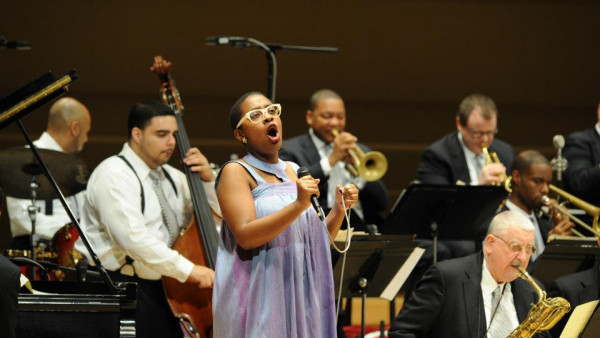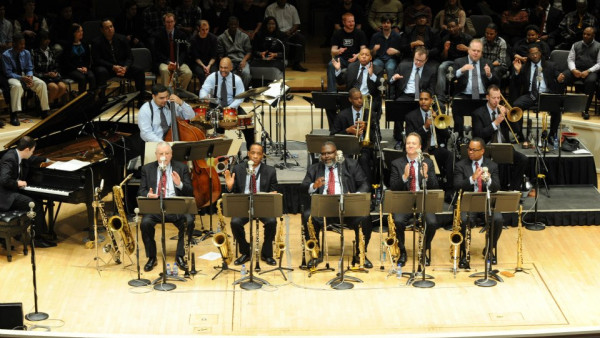A splendid run for Marsalis’ JALC Orchestra – with 1 singer too many
The most haunting moment of the Jazz at Lincoln Center Orchestra’s three-concert Chicago residency came late Friday night, and it barely rose above a whisper.
With an overflow audience crowded onto the stage of Orchestra Hall at Symphony Center, the band eased into the final pages of Wynton Marsalis’ “Big Train,” a sprawling tone poem the ensemble had played at the Ravinia Festival in 1998 in its Chicago-area premiere. This time, Marsalis and the ensemble offered excerpts of a vividly pictorial suite that evoked the moods and tempos of vintage train travel. As the piece wound down to its close, Marsalis – artistic director of the JALC Orchestra – softly whistled a little tune, over and over again, as the band piped down to a hush and the train seemingly disappeared into the distance.
Until this moment, one might never have believed that an audience this large could savor a sound this quiet in a room this spacious. Yet everyone hung onto these notes, relishing the near-silence and imagining, perhaps, a train conductor nonchalantly whistling this ditty, the hum of the locomotive as unintended rhythmic accompaniment.
It was a tour de force of tone painting and musical control, as well as a serenely expressive moment in a concert that also had its share of muscular virtuosity and full-throated ensemble playing. And it reminded listeners that the JALC Orchestra cannot be boxed into any single category of big-band playing: not Duke Ellington-style swing nor Thad Jones-style translucence nor Count Basie-style blues. This band explores all those idioms, and others, as it showed through three concerts, though some moments were slightly more effective than others.
Friday night’s opener, titled “Wynton Marsalis at 50,” marked the bandleader’s landmark birthday (last October) with selections from some of his large orchestral works, none more effective than three movements from “Big Train.” Less famous than Marsalis’ “Blood on the Fields” or “Congo Square,” “Big Train” illuminated Marsalis’ ability to conjure particular sounds – the shriek of a train whistle, the rattle of wheels on steel – while also creating a meaningful music that transcended these orchestral effects. “Big Train” gave rise to radiant clarinet solos from Victor Goines, gently floating melody lines from alto saxophonist Sherman Irby and plush, luxuriant colors from the ensemble at large, all steeped in the blues-swing vernacular of an earlier era.
The swaying habanera rhythms of “Bamboula Dance” from “Congo Square,” Marsalis’ contemplation on the pre-history of jazz, inspired bluesy phrasings from the reeds and punctuating sighs from the Harmon-muted brass of the JALC Orchestra. In effect, ancient and modern impulses merged here, as if two epochs were conversing with one another, precisely the point of “Congo Square” (heard here minus Yacub Addy’s percussion-vocal unit Odadaa!, which brought so much to the Chicago-area premiere of the piece at the Ravinia Festival in 2007).
Marsalis’ “Abyssinian 200” – a Mass written for choir and jazz orchestra – builds on the sacred themes the composer broached in an earlier work for his septet, “In This House, On This Morning.” Marcus Printup’s clarion trumpet solos in the “Body and Blood” movement and Chris Crenshaw’s robust, plunger-muted trombone solos in the “Holy Ghost” section made at least one listener yearn to hear the piece in its entirety, with choristers at full cry.
On Saturday afternoon, Marsalis and the band played a “Jazz for Young People” concert that asked a critical question: “Who is Duke Ellington?” The answer arrived in the form of Marsalis’ stage patter but, more important, in the radiant tone colors of Ellington’s “Black and Tan Fantasy” and the driving rhythms of “It Don’t Mean a Thing If It Ain’t Got That Swing.”
The finale of the engagement came Saturday night with a “Big Band Hits” concert that was both more and less than its name implied. Anyone who deduced from the title that the band would be offering up clichéd repertoire had to be struck by its galvanic performance of Gil Fuller’s arrangement of Dizzy Gillespie’s “Things to Come,” taken at a ferocious tempo and capped by a fleet Marsalis trumpet solo. In Thad Jones’ “A Child is Born,” the JALC band achieved a transparency of texture that it’s not generally known for, with gorgeous playing from the flutes.
Considering the achievements of the ensemble, however, this evening had one vocal soloist too many. The emerging singer Cecile McLorin Salvant lavished a glorious instrument – and plenty of humor – on Ella Fitzgerald’s breakthrough hit, “A-Tisket, A-Tasket,” and ample interpretive imagination on “Sentimental Journey” and “Let Me Off Uptown.”
But the sumptuousness of Salvant’s voice and creativity of her solos made headliner Natalie Cole’s contributions sound conventional, at best. Though Cole turned in solid, capable work, her smallish instrument was dwarfed by the orchestra in “Come Rain or Come Shine” (and elsewhere), while her top-register scat singing sounded pinched, harsh and shrill in “Let There Be Love” (and elsewhere).
Cole’s fans received her warmly and gave her a standing ovation, but on purely musical terms, this was the weak point in an otherwise deeply rewarding residency by a jazz orchestra with few, if any, peers.
by Howard Reich
Source: Chicago Tribune


